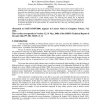Free Online Productivity Tools
i2Speak
i2Symbol
i2OCR
iTex2Img
iWeb2Print
iWeb2Shot
i2Type
iPdf2Split
iPdf2Merge
i2Bopomofo
i2Arabic
i2Style
i2Image
i2PDF
iLatex2Rtf
Sci2ools
SAFECOMP
2000
Springer
2000
Springer
Assessment of the Reliability of Fault-Tolerant Software: A Bayesian Approach
Fault tolerant systems based on the use of software design diversity may be able to achieve high levels of reliability more cost-effectively than other approaches, such as heroic debugging. Earlier experiments have shown that the reliabilities of multi-version software systems are more reliable than the individual versions. However, it is also clear that the reliability benefits are much worse than would be suggested by naive assumptions of failure independence between the versions. It follows that it is necessary to assess the reliability actually achieved in a fault tolerant system. The difficulty here mainly lies in acquiring knowledge of the degree of dependence between the failures processes of the versions. The paper addresses the problem using Bayesian inference. In particular, it considers the problem of choosing a prior distribution to represent the beliefs of an expert assessor. It is shown that this is not easy, and some pitfalls for the unwary are identified. (Presented at...
Fault Tolerant System | Multi-version Software Systems | SAFECOMP 2000 | Security Privacy | Software Design Diversity |
Related Content
| Added | 25 Aug 2010 |
| Updated | 25 Aug 2010 |
| Type | Conference |
| Year | 2000 |
| Where | SAFECOMP |
| Authors | Bev Littlewood, Peter T. Popov, Lorenzo Strigini |
Comments (0)

